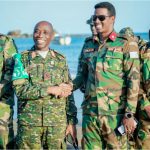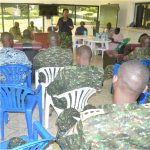Published on 21/07/2025
At the time that Uganda prepares for the 2026 General Election, State minister for Internal Affairs, Gen David Muhoozi, has issued a serious warning to security agencies against torturing suspects while in custody.
Gen Muhoozi’s remarks follow continued outcries from Civil Society Organisations and the Uganda Human Rights Commission (UHRC), which have repeatedly accused some security personnel of being the primary perpetrators of human rights abuses, especially during politically tense periods.

Speaking during the commemoration of the International Day in Support of Victims of Torture held on July 3 in Kampala, Gen Muhoozi said some security operatives play in escalating torture cases across the country. However, he noted that the government is taking deliberate steps to address these violations.

Muhoozi emphasised that even President Museveni has consistently condemned acts of torture, and his position is rooted not in rhetoric, but in a commitment to uphold the dignity and rights of every Ugandan. He further urged all citizens, especially security personnel, to comply with the law and avoid abusing the powers entrusted to them.
“If we all do what we are supposed to do, we shall have free and peaceful elections. But all actors must play their part, not just the security forces. The public also has rights and responsibilities under the electoral laws,” he added. The Minister also addressed longstanding concerns about the behaviour of security officers during elections. He reassured the public that efforts are underway to train personnel in professionalism, discipline, and human rights compliance ahead of the 2026 polls.
Mr Julius Mucunguzi, spokesperson of the Electoral Commission, reiterated the commission’s commitment to ensuring a free and fair electoral process. He clarified the EC’s role as a neutral arbiter. “The Commission does not vote, does not field candidates, and is not the police. We are simply a referee ensuring that Ugandans can freely exercise their mandate, knowing that all power belongs to the people of Uganda,” Mr Mucunguzi said. For years, several human rights organisations have documented a pattern of torture and other abuses, especially during elections.
Mr Mucunguzi said elections are not a battlefield. “Elections are not a war or a do-or-die affair. They are meant to be peaceful, inclusive processes where all actors can participate freely. Elections are the best immunisation against violence, torture has no place in our electoral process,” he said.
Testimony
One of the most harrowing stories shared during the event was that of William Kyomya, a torture survivor whose life was permanently altered in 2018 after he was abducted and brutally tortured by security agents. Kyomya recalls receiving a phone call from an unknown person one evening, asking to meet urgently. Trusting the caller, he agreed to meet at a restaurant in Najjanankumbi, near Freedom City. Upon arrival, he was approached by a man who invited him to sit down. Moments later, he was violently arrested by a group of armed men, some in uniform, others in civilian attire. “They never told me why I was being arrested. My hands were tied behind my back, and I was driven to an unknown location where many security officers were present,” Kyomya recalled. After being transferred between vehicles, first an Ipsum, then a pickup truck, he endured a five-hour journey while handcuffed, beaten, and left exposed to the rain.
Upon arrival, he was stripped, thrown into a cell with other detainees, and held for four days without interrogation or explanation. When he finally asked why he was being held, the response marked the start of his torture. “They blindfolded me, stripped me to my underwear, and started asking where the guns were that killed Kaweesi, Joan Kagezi, and several Muslim clerics,” he narrated. Kyomya said he was electrocuted, beaten, and submerged in a drum of water laced with electric wires. The torture was relentless and continued daily for two weeks. At one point, he lost consciousness. “I spent a whole month in those torture chambers. I came out deaf in both ears, unable to walk without help, and had to be spoon-fed,” he said. After his release, Kyomya revealed that he had lost his reproductive function as a result of the torture. He struggled to return to normal life and suffered significant psychological distress. “Torture destroyed me, physically, mentally, emotionally. It took everything,” he said.








